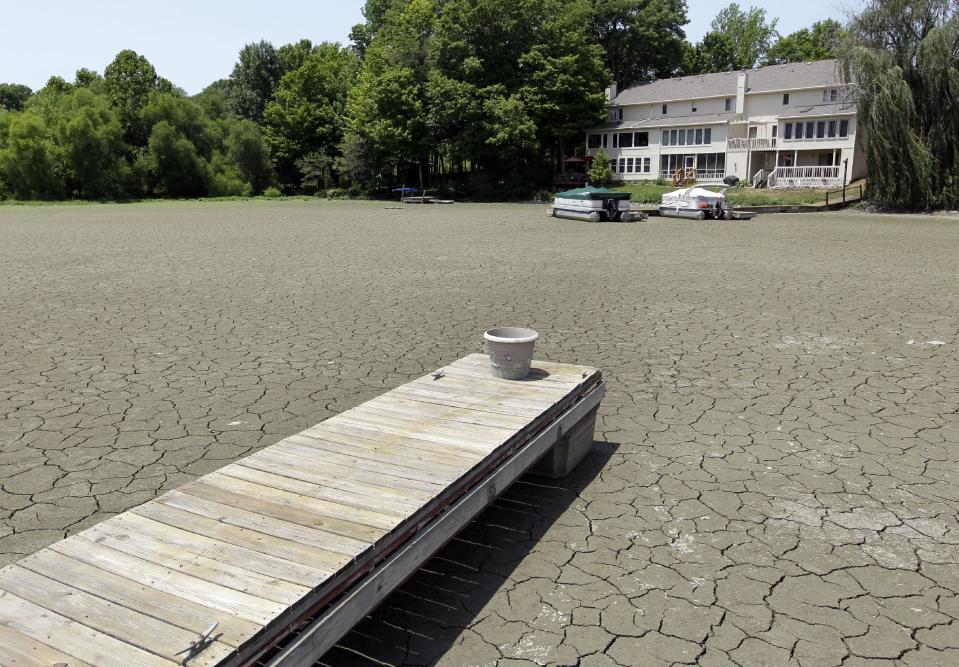Indiana residents asked to cut back on water use
SOUTH BEND, Ind. (AP) — Indiana officials are urging everyone from homeowners and farmers to water utilities to voluntarily reduce water use by at least 5 percent because of the drought, and some in the hardest hit areas are being asked to cut back use by 10 percent or more.
The state Department of Natural Resources and the Indiana Department of Homeland Security have declared a water shortage warning for 32 counties — 18 in the northeast and north-central part of the state, and 14 in the southwest corner. The DNR began sending notices earlier this week to water companies and others in those counties that use more than 100,000 gallons of water a day asking them to voluntarily cut back on water use by 10 to 15 percent.
The rest of the state is under a water shortage watch, meaning users should try to cut back by 5 percent.
"It's designed to put people on notice, to make them aware of what is occurring," said Mark Basch, head of the water rights and use section for the DNR's division of water.
It's only the second time the state has issued a water shortage warning since it put together its water shortage plan in 1994 in the wake of a 1988 drought. The other time occurred in fall 2010 and didn't last long because it was quickly followed by rain, Basch said.
Many cities in Indiana have received less than an inch of rain since June 1. The U.S. Drought Monitor report released Thursday shows nearly a quarter of Indiana is in extreme drought, mostly in the northeastern and southwestern areas of the state, and 69 percent of the state is in severe drought. A U.S. Geological Survey map shows conditions are even worse for Indiana's river and streams, putting much of northern and western Indiana in severe hydrologic drought and much of the rest of the state in moderate hydrologic drought.
Al Shipe, a hydrologist with the National Weather Service in Indianapolis, believes the state should be taking more drastic measures to conserve water.
"In my opinion they should go to a larger water emergency and go to mandatory outdoor restrictions," he said. "The reservoirs are steadily going down and it's only July. We see a little bit of rain on the horizon, but we don't see anything in the way of big rains expected through July."
The Wabash River at Terre Haute has a water flow of 24 percent of normal, the White River in Indianapolis had a flow of 29 percent of normal and many other rivers and streams in Indiana are far below normal. Shipe said Indiana rivers could drop even more if the state experiences another similar hot streak later in July.
"We may get down to the critical levels where they might have to make a decision on whether to shut down the power plants because there's not enough water to cool them off or provide us electricity and kill the fish," he said.
In Indianapolis, which is not in the warning area, Citizens Water announced Friday that it was asking customers to voluntarily stop watering their lawns for a week because of quick drops in water levels at Morse, Geist and Eagle Creek reservoirs, spokeswoman Sarah Holsapple said.
"But a ban could be coming if people don't cooperate, and that would ban all lawn watering for the foreseeable future," she said.
Morse Reservoir is down 3 feet, Geist Reservoir is down 18 inches and Eagle Creek is down a foot.
"That's pretty significant for any time of year, but particularly for this early in summer," she said.
The utility pumped 231 million gallons of water on June 28 and again on June 29, breaking the previous one-day use set in 2008.
In Evansville, which is in the warning area, the city suggested people could save water by showering instead of bathing, turning off the water while soaping or shampooing, keeping drinking water in the refrigerator instead of letting the tap run until the water is cool and washing only full loads of laundry.
Basch said the only way the state would be under a mandatory order to reduce water would be if Gov. Mitch Daniels issued an emergency order.
"I don't see that in the near future, but it depends on how things continue," he said.



